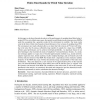Free Online Productivity Tools
i2Speak
i2Symbol
i2OCR
iTex2Img
iWeb2Print
iWeb2Shot
i2Type
iPdf2Split
iPdf2Merge
i2Bopomofo
i2Arabic
i2Style
i2Image
i2PDF
iLatex2Rtf
Sci2ools
128
Voted
JMLR
2008
2008
Finite-Time Bounds for Fitted Value Iteration
In this paper we develop a theoretical analysis of the performance of sampling-based fitted value iteration (FVI) to solve infinite state-space, discounted-reward Markovian decision processes (MDPs) under the assumption that a generative model of the environment is available. Our main results come in the form of finite-time bounds on the performance of two versions of sampling-based FVI. The convergence rate results obtained allow us to show that both versions of FVI are well behaving in the sense that by using a sufficiently large number of samples for a large class of MDPs, arbitrary good performance can be achieved with high probability. An important feature of our proof technique is that it permits the study of weighted Lp-norm performance bounds. As a result, our technique applies to a large class of function-approximation methods (e.g., neural networks, adaptive regression trees, kernel machines, locally weighted learning), and our bounds scale well with the effective horizon of...
Related Content
| Added | 13 Dec 2010 |
| Updated | 13 Dec 2010 |
| Type | Journal |
| Year | 2008 |
| Where | JMLR |
| Authors | Rémi Munos, Csaba Szepesvári |
Comments (0)

